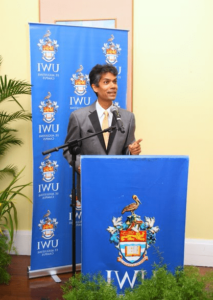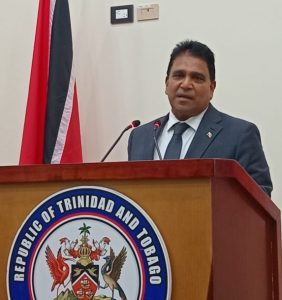
THERE have been sanctimonious talk and articles that would offend supporters and participants of Carnival.
I will not write about the fetes, questionable songs that are divisive/racist or the millions of dollars spent on our culture. Carnival has its fair share of beauty and bacchanal.
The public’s image of Carnival, is often a sensual one in which the female and male revellers are adept at dancing and wining/gyrating. In 2000, Jay-Z, a rap star from the United States, taped segments of Trinidad and Tobago’s carnival for his video Big Pimpin. The scenes from the video focused on women’s posteriors and this created a furore among certain sections of the T&T public.
Two questions arise, should bandleaders be blamed for creating costume designs which are skimpy, tight-fitting and revealing? And are band leaders and the media partly responsible for propagating Carnival stereotypes?
Sometimes it seems similar to the fable The Emperor’s New Clothes in which the masqueraders are conned into parading almost nude in the belief that less is better and their costumes are exquisite.
The design of costumes is not a cause for concern among the big bands. In January 1999, Michael Headley, chairman of the Poison Committee, defended his band’s costumes: “We cater to the demand of those people who spend the time before Carnival in the gyms.”
The skimpiness of costumes in Caribana (in Toronto, Canada) was also highlighted by columnist Raynier Maharaj. Russel Foote, an academic and researcher, examined the public’s perceptions of morality and freedom among female revellers considered indecent. He felt such revellers possess a relatively strong value system: “Given the amount of people thus exposed, levels of tolerance increase. The likelihood of restoring previous standards of civility is reduced and we begin to expose ourselves openly in thoughts, words and deeds.” Undoubtedly, the issue of anonymity in a crowd allows for a certain degree of liberation.

In 2000, in two interviews with the Express, legendary masman Peter Minshall harshly condemned the country’s mas as “making our Caribbean girls look like blonde bimbos… the dregs of Western culture….”
Minshall also claimed that the country’s Carnival had descended into “trashy Las Vegas.” A few years earlier, in 1997, Conrad O’Brien, a Trinidadian and former business executive residing in the United States, felt Carnival had regressed, “…except for a few exceptions it seems to have degenerated into an orgy of gay abandonment and sexuality.”

What is the stance of some religious persons? More than two decades ago, in 2000, Father Clive Griffith of the Anglican Church in T&T, expressed concern over the nakedness of the revellers.
In 2019, Apostle Terence Honore, a respected Christian, penned a letter to the editor of a local newspaper, titled Christians and Carnival, in which he commented, “People pious with ashen-faced, all creeds and race, trying to wash away the sin that stained their skin.” In February 2023, The Catholic News published an article by Father Clement Paul, Vicar-General, Diocese of Bridgetown (in Barbados), who praised our annual festival. Father Paul believed, “And thank God, many, if not most, Christians do get involved in Carnival.”
In 2003, Mushtaq Sulaimani, an imam of the ASJA mosque in San Fernando publicly stated that carnival was the “work of the Devil.”
Others had differing views. LeRoy Clarke, in a Sunday Guardian interview, in 1997, referred to our beloved carnival as “public sex on the streets.” A few months later, in September, Clarke, in a panel discussion, also made a claim that “many women’s sexual urges increase tremendously and they become more fertile.” Indeed, Carnival is associated with liberation of actions, inhibitions and forbidden desires.
And, in 1999, Peter Minshall in “To Play Mas,” in the Caribbean Quarterly journal described Carnival as a “cathartic ritual.” He also claimed in 1997, “Mas’ is not about escapism. Mas’ is really about attaining the highest self.” Probably Minshall made the assumption that everyone would experience this feeling.

It is difficult to criticise or condemn the many carnivals that are celebrated by millions of people in different countries and at different times. Some of us do not express our religious stance or moral view for fear of being branded philistine or mocked as being prudish, conservative or ‘old school’. Then there are those who complain of noise pollution or are victims of crime, experience discrimination or are injured during Carnival and patiently wait for the show to end.
Dr Jerome Teelucksingh is a recipient of the Humming Bird (Gold) Medal for Education and Volunteerism. He is attached to the Department of History at the University of the West Indies at St Augustine. He has published books, chapters and journal articles on the Caribbean diaspora, masculinity, culture, politics, ethnicity and religion. Also, he has produced a documentary – Brown Lives Matter and presented papers at academic conferences.
See other articles by Dr Jerome Teelucksingh on AZP News:
The Influence of Labour on Caribbean Integration
The illusion of political Unity
Presbyterians in Trinidad: Humble Missionaries, Local Workers
Religious Plurality: Curse or Blessing
Caribbean Youth Need Optimism, Patriotism
Rethinking Identities in Caribbean, Latin America
November 19: All Inclusive International Men’s Day
Should International Agencies be Blamed for Unemployment
A Need to Observe Word Unemployment Day
An Ideology for the Trade Union Movement
The Man who Couldn’t be Prime Minister
Social Outburst vs Social Revolution
Challenges of the Men’s Movement
If George Floyd was Denied Parole
The Meaning of Indian Arrival Day in T&T
International Men’s Day – A Way of Life
Wounds that cause school violence
May Day: A Time for Solidarity, Strength
Who Coined the Term ‘Black Power’
The illusion of political Unity
Presbyterians in Trinidad: Humble Missionaries, Local Workers
Religious Plurality: Curse or Blessing
Caribbean Youth Need Optimism, Patriotism
Rethinking Identities in Caribbean, Latin America
November 19: All Inclusive International Men’s Day
Should International Agencies be Blamed for Unemployment
A Need to Observe Word Unemployment Day
An Ideology for the Trade Union Movement
The Man who Couldn’t be Prime Minister
Social Outburst vs Social Revolution
Challenges of the Men’s Movement
If George Floyd was Denied Parole
The Meaning of Indian Arrival Day in T&T
International Men’s Day – A Way of Life
Wounds that cause school violence
May Day: A Time for Solidarity, Strength
Who Coined the Term ‘Black Power’
![]()












